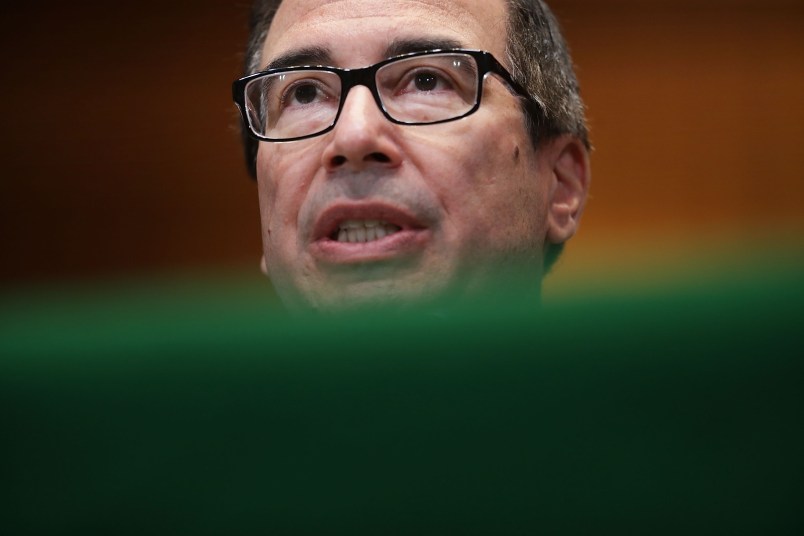Medicare’s trust fund for inpatient care will become insolvent in 2026, three years earlier than previously expected, the trustees reported Tuesday. The insolvency date for Social Security stayed steady, with a projection of 2034. That does not mean, however, that the funds will be exhausted by those dates. Rather, those are the dates that the programs’ costs will exceed the tax revenue coming in. The report found that the programs will be able to cover about three-quarters of promised benefits for the next half-century without any policy changes.
Announcing the report, Treasury Secretary Steve Mnuchin insisted that the tax cuts Republicans passed earlier this year will generate so much economic activity that they will more than cover the benefits of the tens of millions of American who depend on the programs.
“The Administration’s economic agenda – tax cuts, regulatory reform, and improved trade agreements – will generate the long-term growth needed to help secure these programs and lead them to a more stable path,” he said. “Social Security and Medicare are the federal government’s two largest programs, and millions of Americans heavily rely on their benefits. Robust economic growth will help to ensure their lasting stability.”
Tuesday’s report shows, however, that not only has that promised growth failed to materialize, the deep tax cuts are causing the federal trust funds to deplete faster — though the biggest factor is that there are more people retiring and depending on the program than there are taxpaying workers to replace them. The report itself also acknowledged that the tax bill’s health care changes are worsening the Medicare trust fund’s financial future, citing “the repeal of the individual mandate, which increased the estimate of the number of uninsured, in turn leading to a large increase in uncompensated care payments.”
Responding to the new report, House Minority Leader Nancy Pelosi faulted to the GOP tax bill’s impact on declining tax revenues.
“The GOP tax scam’s massive, unpaid-for giveaways to the wealthiest 1 percent and big corporations have gravely undermined the future of Medicare and Social Security, and now Republicans want America’s seniors to pay the bill,” she said in a statement.
Republicans have long called for an overhaul, including deep cuts, to Medicare and Social Security, and House Speaker Paul Ryan vowed the GOP-controlled Congress would get it done in 2018. But the issue proved too politically sensitive to tackle in a midterm election year, and impossible to get through the Senate where Republicans have a narrow majority. It is also unclear whether President Donald Trump would support such a move, as he broke with Republican orthodoxy during the 2016 campaign to promise he would not cut Social Security or Medicare.
Still, some Republican lawmakers immediately jumped on Tuesday’s reports to call for restrictions on eligibility and cuts to Medicare and Social Security.
“Without significant reform to save Medicare and Social Security, these programs will become insolvent and will fail,” Republicans on the House Budget Committee said in a statement. “At that time, America will be propelled into an even greater fiscal crisis or be forced to reduce program benefits for the millions of vulnerable Americans who depend on them today and those who hope to depend on them in the future.”
Democrats, in contrast, have long advocated for higher taxes on the wealthy and corporations to cover Medicare and Social Security costs.







“…the biggest factor is that there are more people retiring and depending on the program than there are taxpaying workers to replace them.”
To me, this says we should recruit immigrants to work here in the US.
OK, but NO IRISH!!
And you didn’t mention the money the Republican budget takes out of Medicare and Social Security–probably to offset the millions and billions given to the Pentagon to (1) buy more toys that don’t work and (2) stuff their pockets with money taken from fraudulent or missing accounting records. Can you say “Panama Papers”?
This is incorrect. It is projected that in 2034 the trust fund reserves will be depleted (exhausted is another phrase for it). There will still be payroll tax revenue coming in, enough to fund 79% of benefits, but there will no balance in the trust fund, no interest being earned.
The report also states that the total program costs now exceed total program revenue ( including interest from the trust fund) in 2018 and will continue to do so for the foreseeable future unless there are policy changes. So the trust fund of 2.8 some odd trillion is at its maximum and will be drawn down to 0 between now and roughly 16 years from now (give or take a few years since the projections are obviously uncertain).